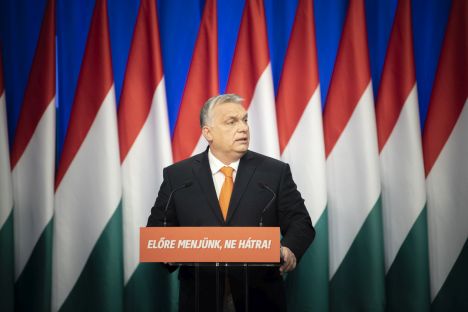Orban voices support for common European defence force
 Prime Minister Viktor Orban said Hungary backs the development of a common European defence force at an annual state-of-the-nation address on Saturday.
Prime Minister Viktor Orban said Hungary backs the development of a common European defence force at an annual state-of-the-nation address on Saturday.
Addressing the Russia-Ukraine conflict, Mr Orban said Hungary is „working for peace”, noting that a war would bring „hundreds of thousands or even millions” of refugees from Ukraine to Hungary, significantly impacting Hungary’s political and economic situation.
He said that Europe would remain „anaemic” without the economic cooperation of Russia and called Brussels’ sanctions against Russia a „dead end”, adding that rejecting cooperation with Russia would give „enormous economic opportunities entirely to China”.
He noted that Hungary is a member of NATO and the European Union, but still maintains „balanced political and economic relations” with Russia.
Mr Orban said Hungary’s security requires „a territory of appropriate breadth and depth” between Hungary and Russia. He added that Ukraine’s „independence and viability is in the direct interest of Hungary”.
He said Europe’s military strength should be „at least comparable with Russia’s” or the security of Europe would be decided not by Europeans, but „by the Americans and the Russians”.
„That is why Hungary backs the improvement of Europe’s military ability and the development of a common defense force,” he added.
He said Hungary has already embarked on the endeavour of building up a modern military and a local defence industry.
„The defence industry must be connected to the economy and network with universities, research institutes and innovation parks,” he added.
PETROL PRICE CAP EXTENDED
Mr Orban acknowledged the global wave of inflation, but pointed to government measures intended to ease the impact of higher prices on households, including a freeze on mortgage rates, a regulated pricing system for household energy, a price rollback for a number of staple foods and a ceiling on vehicle fuel prices.
He said that without the HUF 480/litre cap on retail petrol and diesel prices – initially introduced for a period of three months from November 15 – Hungarians would be paying „well over HUF 500” per litre at the pump.
„The price cap is tried and tested which is why we will extend it for another three months,” Mr Orban said.
HUNGARY ‘FOLLOWS OWN PATH’
Mr Orban said Hungary continued to „follow its own path” during the coronavirus crisis, rather than adopting economic strategies „devised in Brussels”.
He noted that the „Matolcsy-Varga cure” – referring to National Bank of Hungary governor Gyorgy Matolcsy and Finance Minister Mihaly Varga – had produced GDP growth of around 7pc in 2021, more than making up for the decline caused by the pandemic.
„Instead of applying the brakes, Hungary overtook in the curve,” he added.
He said Hungary’s state debt, relative to GDP, is set to fall to 77pc by year-end, and noted that the country’s state debt ratio is even lower than Austria’s.
Mr Orban pointed to the shift in domestic ownership in a number of strategic sectors since his government came to power in 2010. While foreign ownership was 60pc in the banking sector, 66pc in the media sector and 71pc in the energy sector then, now Hungarians hold majorities in all three sectors, he said.










